The realities of running a business in a flat in Singapore, and how some people make it work
Limited space, strict rules and a strain on family life are some of the challenges home-based entrepreneurs must navigate. Their stories take centre stage in the programme On The Red Dot as they find creative ways to keep their ventures going.
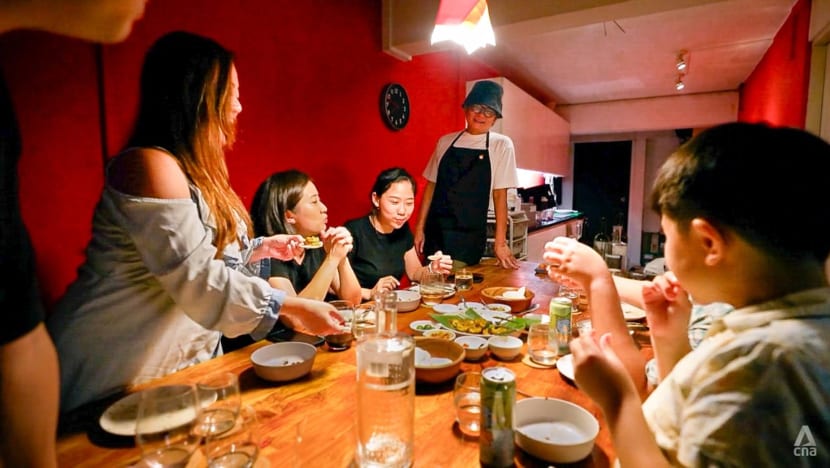
Home-based business owner Ng Tiong Jin (wearing hat) interacting with his private dining customers in his Ang Mo Kio flat.

This audio is generated by an AI tool.
SINGAPORE: The aroma of grilled meat wafts through the air as diners troop in to Ng Tiong Jin’s home.
And for a few hours each time, his Ang Mo Kio four-room flat transforms into a restaurant, filled with chatter and the clinking of cutlery. Wagyu tomahawk steak is often the main draw of his private dining experience, TJBBQ.
He can host more than eight sessions a month. But with two school-going children and a spouse who runs her own home-based accountancy business, scheduling dining slots beyond Fridays and Saturdays is one of the hardest parts of the job.
“Can you try to take fewer sessions on weekdays?” his wife, Serene Loy, asked him as they lunched together one day.
“You can open lunch slots when the children are still at school but try not to take night slots since they need to rest and do their homework.”
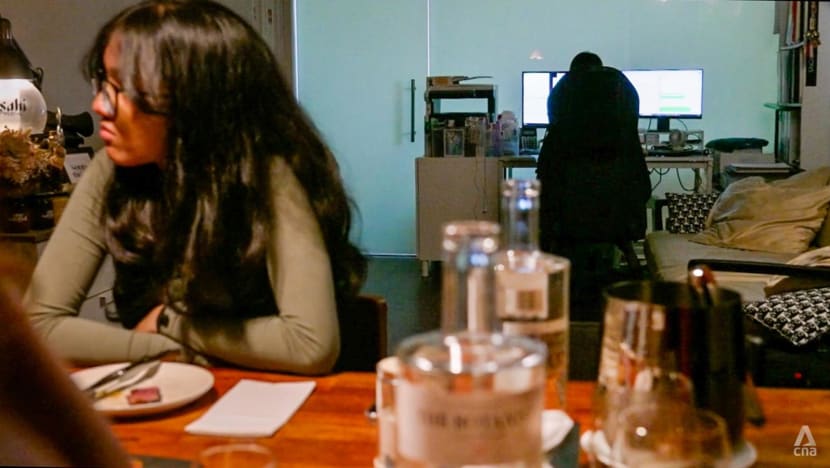
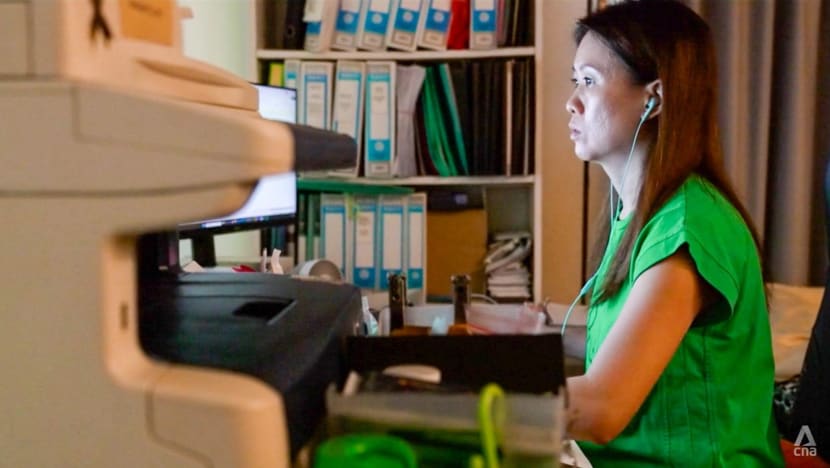
Her work is not spared either. Weekday lunches can clash with her appointments, which means she would have to head out instead to meet her clients.
“Definitely, we’re working with restrictions because we’re sharing the same space,” said Ng, 49. “It’s not just (about) me, … everyone needs to be happy.”
Every booking — with a target revenue of S$1,500 per session — is weighed against family rhythms. And he is not alone in facing this sort of dilemma.
Across Singapore, there are home-based entrepreneurs turning guest rooms into stockrooms, living rooms into cafes and bedrooms into salons.
For some people, what may have begun as a stopgap or passion project has grown into a long-term pursuit as they seek flexible ways to earn income.
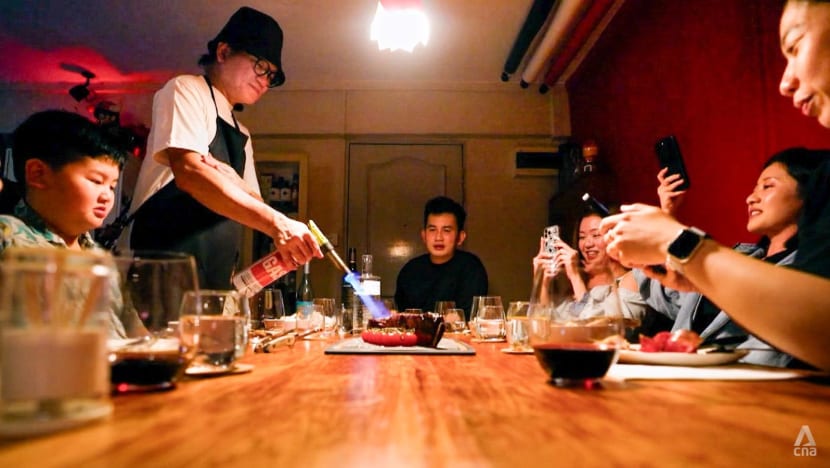
The draw is clear: greater autonomy, lower overheads and a chance to offer a cosier, more personalised service at home. Yet, behind those doors lie stories of blurred boundaries, limited space, hazy rules and constant compromise.
What happens when passion collides with practicality and regulation, or when family needs and responsibilities must be balanced against work demands? Can home enterprises thrive without scaling up? And can Ng smoke his meats without smoking out his neighbours?
These are among the issues explored in the On The Red Dot series, Hustle In My HDB, which uncovers the hidden obstacles, creative solutions and sometimes unexpected support that Singapore’s home-based go-getters find along the way.
FROM MANAGING LOVED ONES TO SUPPLIERS
For many of these small-scale entrepreneurs, the challenge of juggling family life with client appointments is part of the challenge of keeping things professional.
WATCH: This HDB home dining chef serves BBQ food smoked from his utility room (10:10)
Nareeza Abdul Rahim, 38, can spend eight hours a day operating her facial salon, The Face Canvas Beauty and Spa, in a room in her Punggol four-room flat. But it gets more difficult when it is the school holidays.
Her son, now seven, will peek from behind the door and ask: “Are you done? When are you going to be done?” She added: “Sometimes he’d walk around and see what we’re doing.”
During the recent June holidays, she would squeeze in some revision with him before her first appointment — and before he was left to his own devices.
“He knows that I’m busy inside. So he just watches television (and) all the things that I tell him not to watch,” said Nareeza, who worried that she had less control over him when she was working.

To make up for that, she blocked out her the last week of the holidays to spend quality time with him, even though it meant losing out on extra income.
“Throughout my years of working, sometimes I can feel … a bit detached (from) my family,” she said. “The one week … is very important. It’s for us to reconnect.”
Even when entrepreneurs like her can achieve their juggling act, there are other hurdles to overcome. For example, some beauty product suppliers dismiss home businesses as too small to matter.
Nareeza recalled one seller ignoring her texts. “But when my friend who has a shop emailed them and messaged them, (there was) a reply,” she said.
“They might think that we don’t have buying power. Because if they sell to salons, it’d be (profits) on a bigger scale.”
WATCH: How I run my home facial salon as a mum (13:00)
Edward Kim, 45, a hairdresser who operates The Gangnam Salon in his Telok Blangah four-room flat, echoed this sentiment.
“If they’ve never come here before — to a home-based salon — maybe they think (it’s) not clean, not professional,” he said. “Once they come here, … they’d think (differently).”
LIMITED SPACE AND MANPOWER ISSUES
Still, working within the confines of their flats is a big challenge. Bedrooms may double as storage areas, spare corners fill up with equipment, and surfaces are stacked with supplies.
Kim said he may not be able to keep The Gangnam Salon going when his two children are older.
“They’re (of) different genders,” he said. “So, in the future, (when) they say, ‘Daddy, I want my own room’, then I must give up this salon, or we move (to a) bigger house.”
WATCH: This Korean dad runs a hair salon in his HDB flat (9:52)
Nareeza faces similar constraints. She dreams of expanding her services but rues the lack of space for more equipment.
Then there is the issue of manpower. She wishes to hire therapists, but the current rules prohibit her from employing non-residents of her flat.
To generate income in other ways, she has held mentoring sessions at home and runs skincare workshops outside. “Within the four walls of (a flat), there’s only so much we can do to expand the business,” she said.
Without the ability to hire external help, some owners must shoulder every task — or depend on friends and family.
Chia Jin Fang, who left a Michelin-starred restaurant to start The Noob Coffee in her Boon Lay four-room flat, feels this acutely. She is a “one-man show” who brews, mixes, serves, cleans and takes orders.

“On some days when it’s really hectic, it can be very overwhelming,” she said.
Although her friends and family pitch in at weekends, she knows this is not sustainable. “They aren’t paid at all, they’re just helping me out of goodwill,” said the 30-year-old, who considers herself “very lucky”.
In the long run, if there’s nobody who’s going to help me, I think I'll … stop walk-ins and only go (on an) appointment basis. … After all, there’s just one pair of hands and one coffee machine.”
But even when exhausted, she relishes the “sense of fulfilment” in running her home cafe, having wanted to “try something different” from cooking while being able to watch over her grandmother, who is 86 and has dementia.
WATCH: Millennial gives up Michelin kitchen job to run home cafe and take care of Grandma (11:18)
And she plans to keep The Noob Coffee going for as long as her grandmother is around.
For home-based business owner Pannipa Mitrach, 43, who goes by the name of Ann, cooking her Thai noodles is possible only when her husband, Ron Koh, is around to handle customers and deliveries. Without him, she cannot cope.
They run Anngel Thai Noodles in their Balestier five-room flat. “I have to see (if) my husband (is) free (at) the same time (as) me,” she said.
As he has a full-time job, she can work only five or six days a month. During exceptional periods, this can go up to 11 days in a month.
WATCH: How this mum is building her Thai noodle business from her home kitchen (11:05)
“The work schedule (revolves) around me to make sure that I have time and I have the energy … to help her,” he said. “But it’s her passion.”
Although she feels tired after cooking, she finds joy in contributing to the household income after many years as a housewife. “I’m happy to spend this money for myself and for my kids,” she said.
NAVIGATING THE RULES
As with other businesses under Singapore’s Home-Based Business Scheme, food and beverage sellers do not require approval or any Singapore Food Agency (SFA) licence to operate. But they remain bound by food safety standards.
The guidelines in place, however, can leave some of them feeling uncertain, for example when home cafe owner and micro-roaster Chen Delun, 40, considered upgrading to a larger machine to double his output.

A small cafe had approached him to supply it with roasted beans weekly, which he estimated could add around S$1,500 to his monthly revenue from running Spilled Roaster & Brews in his Tampines five-room flat.
While the SFA prohibits home-based sellers from supplying businesses, Housing and Development Board (HDB) guidelines also ban heavy equipment as that would not be for domestic use. “But what’s considered a commercial machine?” Chen began to wonder.
Is it the size? Is it the exhaust output? The noise?”
Asking the HDB for clarification did not provide a clear answer. He has since turned to e-commerce, posting his beans in small batches directly to customers across the island.
“I can expand my market range,” he said. “And mailing is very cheap.”
WATCH: My micro cafe and roastery in my HDB flat after being retrenched (12:43)
Another limitation under current rules for residential premises is that shopfront signage, which could attract walk-in customers, is forbidden — much to Chia’s consternation. During her opening week, she was advised by CNA’s producers to bring her signage indoors.
“I wanted people to sometimes walk past … and realise there’s coffee and matcha here. I’ll just keep my doors open,” said the barista. “But I also hope that for home-based businesses, (the authorities) won’t be so strict (with) us.”
BEING MINDFUL OF NEIGHBOURS
As the authorities do not actively monitor home-based businesses, enforcement typically begins with neighbours’ complaints. Ng, the private dining chef, learnt this early when his neighbours objected to him barbecuing meat in the common corridor.
Town council officers stepped in, and he had to adapt. Today, he cooks in his utility room, using a makeshift vent to redirect smoke and adjusting the barbecue process too.
“Hot and fast barbecuing will create a lot of fire and smoke, so I designed … a low and slow approach, which requires a longer time,” he said. His pork ribs, for instance, take four hours to cook.
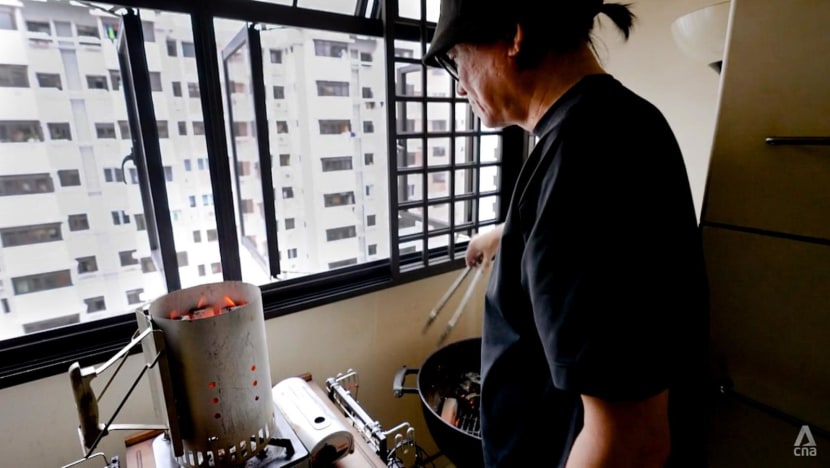
As for Chen, being mindful of the neighbours is part of the business strategy. He usually roasts his coffee beans on Monday mornings, when most residents are at work. And he only accepts customers by appointment.
“I don’t allow walk-ins because it’s a bit hard for me to manage the crowd, and I don’t want people to be crowding outside,” he said.
Without physical visibility, social media and word of mouth have become lifelines for these micro-businesses hoping to be discovered by new customers.
Kim recalled how his hairdressing salon barely had patrons when he was not active online. Today, he posts on Instagram and TikTok regularly.
He has also collaborated with other entrepreneurs nearby to provide referrals. “Next time I’ll bring my wife,” he told a neighbour running a home-based eyelash extension service. “Then if you come to my salon, I’ll give you a special discount.”
As a business owner also seeking to build such connections, Chen sees a “digital kampung” coming to the fore. “Sometimes we gather, we share information, we barter,” he said. “You give me cake; I give you coffee. It’s very fun.”
Watch the On The Red Dot series Hustle In My HDB here. The programme airs on Channel 5 every Friday at 9.30pm.


















